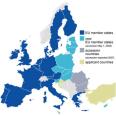
| Big Business |
 |
followthemedia.com - a knowledge base for media professionals |
|
|
AGENDA
|
||
Big Media Rushes Into Next EU Accession CountriesJust being “in talks with the European Union” is good enough to send media investors cruising the streets looking for deals. As countries turn themselves up-side-down conforming to EU accession demands, big media companies bring cash and expertise intent on cornering the markets early…but not too early. So far, this strategy works. But, how far east can it go?
|
| ftm background |
|
Buy Out Firms Buy Out SBS Broadcasting More Easy Pickings in Russian Media More Belarusian Music on Radio, More Belarusian Models on Billboards SanomaWSOY, Axel Springer, Ringier, WAZ and Handelsblatt Expand, Consolidate East European Operations. Lagardere Looks to US Hispanic Market Communicorp Buys Metromedia International Stations |
Emmis International acquired from GCap Media and local investors, pending all appropriate approvals, a majority holding in Radio FM Plus in October for $3 million. The transaction includes a minority stake in Fresh! FM. Both acquisitions are national networks, Radio FM Plus programming adult contemporary (AC) music and news, Fresh! FM programming contemporary hit music (CHR). Radio FM Plus founders Petar Pountchev and Konstantin Tilev will remain with the company. GCap Media, originally GWR Media, held 48% of Radio FM Plus, which it acquired in 1994.
NRJ – the brand, not the company - has also arrived in Sofia as Communicorp bought syndication rights to the name and format, likely preparing for a Bulgarian ratings battle. Last year Communicorp, based in Dublin, bought most – but not all – of the Metromedia International radio stations, including BG Radio, Radio Nova and a majority stake in Radio 1 in Bulgaria.
Murdoch’s News Corp. landed in Bulgaria in 2000 launching bTV, the first national commercial television network. Wholly owned subsidiary Balkan News Corporation made known in mid-November intentions to spend another €50 million in radio and outdoor advertising businesses.
German newspaper giant Westdeutsche Algemeine Zeitung (WAZ) owns the two major Bulgarian dailies: Trud and 24 Chassa.
At the Forum Invest conference on economic partnerships in Central and Eastern Europe in Vienna earlier this week (November 28-29) Austrian Federal Economic Chamber vice president Heinz Kogler presented a sobering report suggesting a generation – “more than 30 years” – would pass before Bulgarians and Romanians reached 75% of the average per capita income of current EU Member states. Romania leads the South-East Europe region in foreign investment, €821 million, followed by Bulgaria, at €723 million.
 Both SBS Broadcasting (now owned by Kohlberg, Kravis & Roberts – the junk bond kings) and Central European Media Enterprises (CME) are entrenched in Romanian television. Indeed, CME benefited to the tune of €350 million in an arbitration settlement won from the Czech government – before accession - related to TV NOVA; proving that pan-European courts have impact on national governments. Canadian media giant CanWest recently invested in radio networks in Turkey, also – and not without considerable discussion – on the EU short-list. CME owns television stations in Croatia, also on the short-list, and Ukraine, on the very long-list. WAZ, Styria and Sanoma own newspapers in Croatia.
Both SBS Broadcasting (now owned by Kohlberg, Kravis & Roberts – the junk bond kings) and Central European Media Enterprises (CME) are entrenched in Romanian television. Indeed, CME benefited to the tune of €350 million in an arbitration settlement won from the Czech government – before accession - related to TV NOVA; proving that pan-European courts have impact on national governments. Canadian media giant CanWest recently invested in radio networks in Turkey, also – and not without considerable discussion – on the EU short-list. CME owns television stations in Croatia, also on the short-list, and Ukraine, on the very long-list. WAZ, Styria and Sanoma own newspapers in Croatia.
 Where does the well-healed media baron now turn as newspapers, television and radio stations are gobbled up in the short-listed EU accession countries? Ukraine is obvious. Rupert Murdoch has already visited Mr. Yushchenko and today (December 1) the EU granted Ukraine “market economy” status. But, then there’s always Belarus...with those wonderful billboards.
Where does the well-healed media baron now turn as newspapers, television and radio stations are gobbled up in the short-listed EU accession countries? Ukraine is obvious. Rupert Murdoch has already visited Mr. Yushchenko and today (December 1) the EU granted Ukraine “market economy” status. But, then there’s always Belarus...with those wonderful billboards.
Radio audiences change slowly in Bulgaria even with more station going on-air. At present there are more than 200 radio stations including public channels.
Horizont, the main national channel of Bulgarian Radio (BR), holds a 27.9% market share, according to the most recent audience survey by Alpha Research released in July. From the 2004 survey, this is slight increase for the general interest and news channel. Horizont operates on FM, AM, short-wave, long-wave and the internet, the most extensive distribution of any broadcast channel in Bulgaria.
Radio Darik, the first licensed private national station and now in its 13th year, ranked second with 11% share, unchanged from 2004. Closely followed and slightly increasing is Radio Vesselina with a 10.7%.
In the capital Sophia 33 stations compete for listeners among a population of millions. Horizont leads with 20.3%, followed by Radio Darik (14.4%), Radio 1 (14.1%), Vitosha (13.1%), Vesselina (12.3%).
Gross radio advertising revenue in 2004 was €13.3 million, increasing 15% over 2003, according to a report from the Association of Bulgarian Broadcasters (ABBRO).
“In 2004 some companies even managed to nearly double their incomes,” said ABBRO executive director Anotaneta Arsova. Fewer than one-quarter of Bulgaria’s radio broadcasters take 90% of radio ad revenue, mostly those with national or near-national reach.
Previously published in Radio World International, November 2005, in a slightly different form.
| copyright ©2005 ftm publishing, unless otherwise noted | Contact Us • Sponsor ftm |